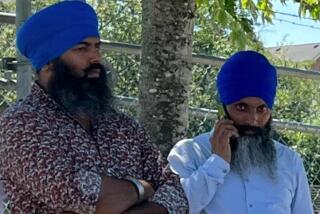Gandhi Defends Decision on Punjab Vote : By Not Postponing Election, He Seeks to Isolate Sikh Extremists
- Share via
NEW DELHI — Prime Minister Rajiv Gandhi on Friday defended his decision to go ahead with Punjab state elections despite the terrorist assassination of a prominent Sikh political leader, saying, “A democratic election is the people’s answer to . . . brute force.”
Government and other political sources said, meanwhile, that Gandhi’s decision represents a gamble that outrage over the killing has isolated Sikh extremists from the rest of the population.
Speaking to the Lok Sabha, lower house of the Indian Parliament, Gandhi said, “In the context of recent events in Punjab, the electoral process has . . . acquired a new national significance.”
He appealed to all political parties to participate and added: “How individual parties fare is of little consequence. It does not matter who wins and who loses. What matters is that the lamp of democracy is not extinguished. What does matter is that India wins.”
Unrest Delayed Election
Elections have not been held in Punjab, home of more than half of India’s 15 million Sikhs, for more than five years because of separatist unrest. Last week, the Gandhi government announced that elections for state and national legislative posts would be held there Sept. 22.
But after Harchand Singh Longowal, president of the Sikhs’ Akali Dal political party, was assassinated Tuesday, many opposition leaders and members of Gandhi’s own Congress-I Party, urged the prime minister to postpone the vote, arguing that it would lead to more violence. For one thing, they said, each candidate is likely to become a target for terrorists seeking a separate, independent state for Sikhs in the Punjab.
However, Gandhi was swayed by widespread revulsion over the killing of Longowal, a soft-spoken, religious man of 57 who was gunned down by four Sikh terrorists in a Sikh temple. On July 24, Longowal had signed an agreement with Gandhi to end a five-year confrontation between Akali Dal, the main Punjabi Sikh political party, and the central government. His assassination was blamed on extremist Sikh separatists opposed to that peacemaking move.
According to an aide, Gandhi’s decision Thursday to go ahead with the Sept. 25 election, only three days later than originally planned, was also based on an analysis that the Longowal killing, along with other killings and bombings in the past six months, has turned most Sikhs against the extremists.
Sikh Dismay Seen
“Our reading is that this murder of Longowal will deepen the revulsion,” the aide said. A number of Sikh leaders said much the same thing, that even many militant Sikhs were dismayed by the killing of the white-bearded former village preacher in the heart of a temple.
Khushwant Singh, a leading Sikh historian and member of Parliament, said Friday that he believes the Longowal assassination “may help turn things around. (The killing) has produced a sense of revulsion among the Sikhs that has never been there before.” It was, he said, “a great sin.”
Shortly before his death, Longowal reached agreement with his two main rivals in Akali Dal to present a united front in the September elections. In addition, he had said that the all-Sikh party would run Hindu candidates in some districts, a move aimed at easing some of the tension that has developed in recent years between Sikhs and their Hindu neighbors. Sikhism, an ecumenical faith with martial traditions, embraces many Hindu teachings, and Sikhs and Hindus often worship in each other’s temples.
On Friday in Chandigarh, the secretary general of Akali Dal announced that the party will participate in the elections even though several parties have threatened boycotts.
‘A Sheer Good Man’
The main problem facing Akali Dal will be finding a replacement for Longowal, who had emerged as the ideal leader, acceptable to both Sikhs and many Hindus in Punjab, where Sikhs have a majority.
Longowal “was not a person of great political skill or intelligence,” said the aide to Gandhi. “He was a sheer good man--not just a leader of the Sikhs of Punjab but truly a leader on a national scale.”
The person most likely to replace him as leader of the Sikhs is another moderate, Prakash Singh Badal, former chief minister of Punjab. However, Badal was openly critical of last month’s Gandhi-Longowal agreement, arguing that the agreement does not grant enough concessions to the Sikhs.
Moreover, Badal has flirted politically with the rival United Akali Dal party, an extremist organization headed by the 83-year-old father of Sikh separatist Jarnail Singh Bhindranwale, who was killed in the Indian army’s raid on the Sikhs’ sacred Golden Temple in Amritsar in June, 1984.
Extremist Action Feared
“There will be extremists trying to disrupt the election,” the Gandhi aide said Friday. “It is a rule of terrorism that when you begin losing you become more desperate.”
Gandhi himself, who was the target of a Sikh terrorist plot broken up by the FBI in the United States earlier this year and who, aides fear, remains a target of extremists, commented on the dangerous mood in his speech to Parliament:
“We shall serve as the instrument to enable the democratic process to triumph, whatever the risk to ourselves. As the custodian of the people’s will and mandate, I am fully committed to this course. Our democratic society has the inner strength to close its ranks and face the dangers that confront it.”
More to Read
Sign up for Essential California
The most important California stories and recommendations in your inbox every morning.
You may occasionally receive promotional content from the Los Angeles Times.













